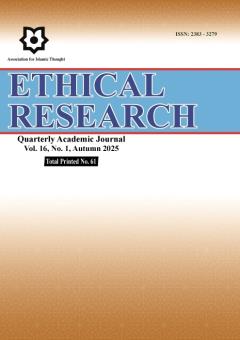Preventive and Ethical Obligations of Electronic Registration of Official Documents on the Prevention of Forgery of Official Documents
Subject Areas : اخلاق و تربیت اسلامیMohammad Khosravi 1 * , Soudabeh Rezvani 2 , Sakineh Khan Alipour 3
1 -
2 - Department of Law, Khwarazmi University, Tehran, Iran.
3 - Department of Law, Imam Khomeini International University, Qazvin, Iran
Keywords: Ethical Requirements, Electronic Registration, State Prevention, Forgery, Official Documents.,
Abstract :
The use of preventive and ethical requirements in the electronic registration of official documents can significantly help in preventing the forgery of official documents. With the correct trust and confidence that people have in electronic official documents, these documents are considered as a source of validity and effectiveness, and the possibility of forgery or changing them is reduced. The system of instant registration of transactions, which is foreseen in the fifth development plan, by electronicizing all the stages of setting up and registering the transfer of official documents, provides the possibility for notary offices to register the transactions of individuals in the online process of the desired database about natural and legal entities. have access The basic question that is raised and investigated in this regard is, what is the effect of the preventive and ethical obligations of instant registration on the prevention of forgery of official documents? The current article is descriptive and analytical and has investigated the mentioned subject by using the library method. The results show that the elimination of handwritten books, including the notary's book and the signature certificate book, has had a significant effect in reducing crimes such as forgery and the use of fake documents. Preventive measures can include the use of fraud detection systems, strong encryption, two-step authentication, continuous monitoring of accesses and changes to documents, and the like. These measures effectively prevent any attempt to forge or alter official electronic documents. From an ethical point of view, emphasis on transparency, correctness, and trustworthiness in the registration and management of electronic official documents can help to promote the trust and credibility of documents. Compliance with ethical principles in relation to official documents has a significant effect in preventing their fraud and forgery. The implementation of instant registration in notary offices and equipping notary offices with electronic fingerprinting system will help the notary to a great extent in the matter of identity authentication and lay the foundation for the reduction of forgery crimes and the forgery of Article 100 of the registered law and to improve the speed and Accuracy in the preparation and registration of documents, authentication of persons, prevents the malicious intent of users, while informing about prohibited, barred and bankrupt persons prevents them from trading and the occurrence of subsequent problems, and the application of the electronic registration method in the country guarantees the security of official documents and Reducing the platform for committing crimes and common violations in the field of document and real estate registration, such as forgery.
ابراهیمی، شهرام و صادق نژاد نائینی، مجید، تحلیل جرم شناختی جرائم ثبتی، فصلنامه حقوق کیفری، دوره دوم شماره ۵ زمستان ۱۳۹۲
اسدي، محمدمهدي، (1394)، «بررسي جايگاه حقوقي ثبت الكترونيكي»، ماهنامه علمي – تخصصي‹كانون›، كانون سردفتران و دفترياران، شماره 134 و 135.
آدابی، حمیدرضا، (1392)، حقوق ثبت تخصصی، چاپ دوم، تهران، انتشارات جنگل.
آدابی، حمیدرضا، (1389)، مسئولیت کیفری سردفتران اسناد رسمی در حقوق ایران و فرانسه، انتشارات جنگل، جاودانه، چاپ اول.
آذر پور، حمید؛ حجتی اشرفی، حمیدرضا، (1395)، مجموعه محشای بخشنامههای ثبتی تا دهم شهریورماه ۱۳۹۳، انتشارات گنج دانش، محمدی، فناوری اطلاعات در دفاتر اسناد رسمی.
بیات، بهرام وهمکاران، پیشگیری از جرم باتکیه بر رویکرد اجتماعمحور(پیشگیری اجتماعی از جرم)، معاونت اجتماعی نیروی انتظامی، اداره کل معاونت اجتماعی، 1387.
توسلی، علی، (1389)، نقش سازمان ثبت در پیشگیری از وقوع جرم، ماهنامه کانون سردفتران، شماره 114.
جعفری لنگرودی، محمدجعفر، (1385)، ترمینولوژی حقوق، انتشارات گنج دانش، چاپ شانزدهم.
چاله چاله، فرشید، (1387)، «اصول و مبانی پیشگیری از جرم، ماهنامه دادگستری»، شماره 68، سال دوازدهم.
رهامی، محسن و حیدري، علی مراد، ()، چالشهای فراروي سیاست جنایی در قبال جرائم بدون بزه دیده. شماره پیاپی 845 -، شماره 70، 1384
سالاری، حسین، (1394)، محشای قانون ثبت اسناد و املاک، انتشارات چراغ دانش، سال
السان، مصطفی، ثبت اسناد و فنآوری ارتباطات، تلاقی سنت و نوآوری، ماهنامه حقوقی کانون سردفتران و دفتریاران، شماره ۶۴، دوره دوم، سال ۴۸، مهرماه ۱۳۸۵.
السان، مصطفی، (1384)، جایگاه امضای دیجیتالی در ثبت اسناد به شیوه الکترونیکی، ماهنامه حقوقی کانون سردفتران و درفتریاران، سال ۴۷ شماره ۵۵ دوره دوم.
السان، مصطفی، جنبههای حقوقی ثبت الکترونیکی، ماهنامه حقوقی کانون سردفتران و دفتریاران، شماره ۶۰، دوره دوم، سال ۴۸، فروردینماه ۱۳۸۵.
شهری، غلامرضا، (1393)، حقوق ثبت اسناد و املاک، نشر: جهاد دانشگاهی، دانشگاه علامه طباطبایی.
صفاری، علی، (1381)، انتقادات وارده به پیشگیری وضعی از جرم، تهران: نشریه تحقیقات حقوقی شماره 35 -36.
عمید، حسن، (1389)، فرهنگ فارسی عمید، انتشارات رهیاب نوین هور.
فتح آبادی، حسین، (1384)، پژوهشی در جرم استفاده از سند مجعول، فصلنامه الهیات و حقوق، شماره 15و16.
کی نیا، محمد؛ فاطمیان، مسعود، (1395)، قواعد حاکم بر حقوق اسناد الکترونیکی (با توجه به قوانین داخلی و بینالمللی).
محسنی، وجیهه؛ (1393)، شریعت کرمانی، حسین، مطالعه تطبیقی ساختار و وظایف دفاتر اسناد رسمی در ایران و فرانسه، انتشارات نگاه بينه، ج اول.
محمد نسل، غلامرضا، (1387)، پلیس و سیاست پیشگیری از جرم، دبیرخانه همایش ملی پیشگیری از وقوع جرم، دفتر تحقیقات کاربردی پلیس ناجا.
محمدی، سید فریدالدین، فناوری اطلاعات در دفاتر اسناد رسمی، ماهنامه حقوقی کانون سردفتران و دفتریاران، شماره ۷۹، دوره دوم، سال ۵۰، فروردین ۱۳۸۷.
معین، محمد، (1386)، فرهنگ معین، انتشارات زرین.
میرزایی، علیرضا، (1385)، حقوق کاربردی، تهران: نشر بهنامی.
نجفی ابرندآبادی، علی حسین، (1381)، پیشگیری از جرم و پلیس محلی، مجله تحقیقات حقوقی، شماره ٢5.
نوری، محمدعلی و نخجوانی، رضا، (1390)، حقوق تجارت الکترونیکی، انتشارت گنج دانش.

